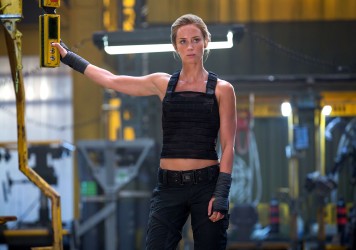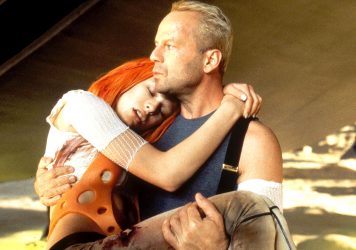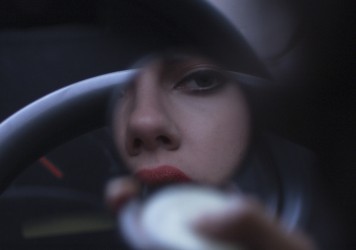Who remembers the last good Luc Besson movie? Time to reset that particular clock, as he’s returned with a stormer.
There’s a scene towards the end of Lucy where Scarlett Johansson’s drug-enhanced title character has learned to use more than 80 per cent of her cerebral cortex, and is rapidly evolving into a perfect cross between Dr Manhattan and a high-end perfume ad.
As stalagmites of gooey black nanotechnology ooze from Lucy’s body and the film begins to feel like a glossy version of Akira (only one that wouldn’t dare infringe on the beauty of its star), Luc Besson’s vision for the film finally comes into perfect focus: this isn’t just the story of a woman who realises the full potential of her brain, it’s also the story of a filmmaker remembering the full potential of his genre.
In a 1985 interview conducted by ‘The New York Times’, Besson attempted to validate his generation of French directors — often accused of being greater stylists than storytellers — by predicting that, “Our ardor alone is going to shake the pillars of the moviemaking establishment”. Since co-founding EuropaCorp in 2000 and subsequently growing it into one of the largest fully integrated independent studios in the world, Luc Besson seems to be running on ardor alone.
Revered as one of the finest and most eccentric commercial filmmakers of the 1990s, Besson cashed in the reputation he built on the strength of contemporary action classics like Léon and The Fifth Element in order to own and operate a factory where lesser talents could photocopy the Cinéma du Look playbook with all of his style and none of his grace. That wildly reductive take on EuropaCorp’s output aside, it can’t be denied that, in the years since the foundation of his studio, Besson has become less of a filmmaker than an empire (a point that becomes doubly convincing when considering the films that he’s directed during that time).
Which is all to say that as far as Scarlett Johansson vehicles are concerned, Lucy is a veritable time machine. One of the most exciting, brilliant and insane action films in recent memory, Lucy doesn’t feel like the work of someone who has a studio on the line so much as it does the work of someone who has absolutely nothing to lose (least of all his mind). As a result, what seemed like a rather dubious proposition has – against all odds – almost single-handedly redeemed a summer of turgid blockbuster cinema.
Lucy is Luc Besson’s The Tree of Life, and so it follows that the film’s ambition goes hand in hand with its goofiness. The movie begins by considering the entire scope of life on earth before centring its attention on a blonde American party girl named Lucy (Scarlett Johansson) whose time in Taipei is about to take a turn for the weird. The new Danish boyfriend she met in a nightclub (natch) is forcing her to deliver a shady package to a shadier business man (OldBoy star Choi Min-sik as Mr Jang), and in a matter of minutes Lucy’s intestines – like those of the diva in The Fifth Element – are going to become the new home for a very precious package: a massive quantity of a drug called CPH4.
The package bursts, thousands of the little blue crystals inside begin to spill into her bloodstream, and what begins as the greatest Adderall rush of all time quickly evolves into something more profound as the chemical compound soon allows Lucy to tap into the dormant potential of the human brain. The once unremarkable young woman soon begins busting down the cerebral levees that limit us from seeing space-time and making better blockbusters, but when Lucy’s body threatens to disintegrate if she doesn’t receive additional doses of the drug, she jets off to Paris in search of a prominent scientist (Morgan Freeman as Professor Norman) who might have an idea how to solve this most unusual problem.
On the day that Lucy opened in the US, a note that Besson allegedly attached to the front page of his film’s script began to circulate around the web. “This film is extremely visual”, Besson wrote. “It is difficult to describe in words without running the risk of losing or boring the reader.” Yup. “The beginning is Léon, the middle is Inception, and the end is 2001: A Space Odyssey.” Who needs critics?
But if both the film’s various forms are so knowingly familiar, it’s how Besson violently mashes them together that allows Lucy to become something vibrant and new. The movie is like a Frankenstein’s monster that borrows limbs from four different species and somehow runs faster than any of them did when they were whole and moving as nature intended. Lucy lacks the heart of Leon, the grace of Inception, and the gravitas of 2001, but it has the courage not to care.
The movie may be about a woman who becomes unfathomably intelligent, but it also dares to be stupid. A perfect example can be found at the top of the film, Besson intercutting the botched drug exchange with archival footage of a tiger hunting and killing a gazelle. Even the most passive of viewers will pick up on the obvious meaning of this dialectic montage, but Eisenstein was never aiming for subtlety. It’s the effect that’s the key, and Besson’s transparent tricks (of which this is but one of many) aren’t designed to flatter audiences, but to prepare them for what’s coming.
The spirited obviousness that drives the first two thirds allows Besson to balance an incredibly simple story with its vastly metaphysical reach – it’s amazing how much a scattered handful of time-lapse shots (some borrowed from Samsara) can help bridge the gap between Leon and 2001, Lucy empowered to cover an astonishing amount of ground in its brief running time because Besson points viewers towards nature, history, and the cosmos from the very beginning. The silly maximalism of his style is fun on its own (it doesn’t hurt that all of the action beats are executed masterfully, each of the film’s 85 minutes dense with the information of two), but in hindsight it becomes clear that Besson is also setting the stage for his transcendent endgame, lubricating his audience with laughter.
And the film, to be clear, is more than happy to have you laugh along with it. It would be a critical mistake to confuse Besson’s ambition for pretension, to forget that the confident chaos of the third act stems from the same movie in which a drug overdose instantly transforms a party girl into John Woo’s wettest dream. As the movie’s confrontational last line underscores with an appropriate lack of subtlety, Lucy isn’t a step into a brave new world, it’s a challenge to do more with the one we’ve got.
Besson isn’t reinventing action cinema, he’s simply reminding us that it can be as limitless as the cinema, itself. Besson may never have left, but it sure is great to have him back.
Published 21 Aug 2014
Luc Besson is still directing movies?
Heaven is for real.
The most fun (and completely insane) action movie of the summer.

A weedy Crusier is dropped into a time-switching sci-fi set-up, with undeniably interesting results.

Twenty years on, Luc Besson’s neon-hued space opera has lost none of its off-kilter charm.

By Violet Lucca
Jonathan Glazer’s erotic and philosophically-inclined feminist sci-fi fable is an extraordinary one-off.